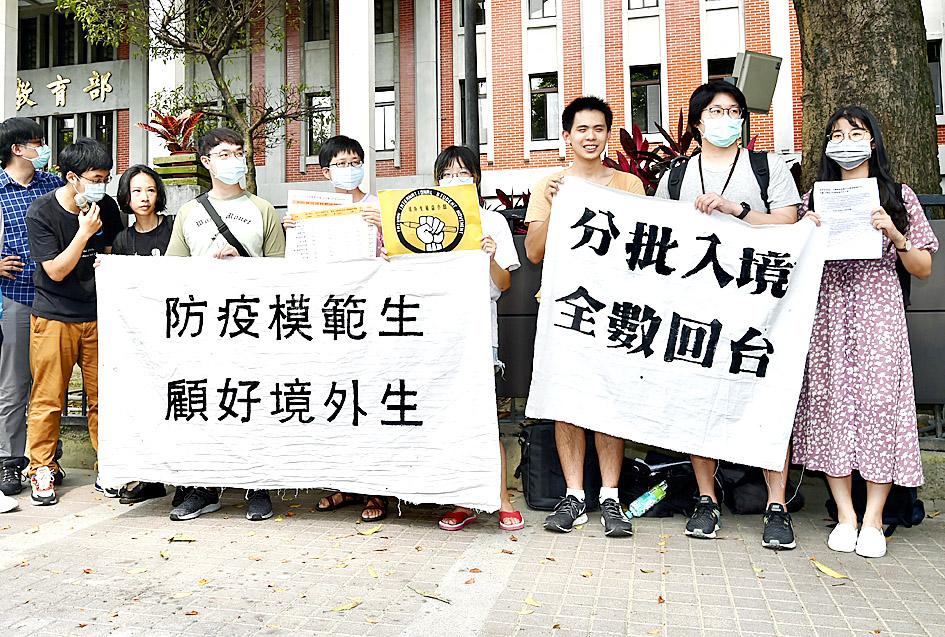Nearly 40 percent of the nation’s imported COVID-19 cases were intercepted at the border, the Central Epidemic Command Center (CECC) said yesterday, adding that maintaining strict border controls remains an important policy.
The center would only consider reopening the border if the nation’s disease situation remains stable after domestic restrictions have been lifted, Minister of Health and Welfare Chen Shih-chung (陳時中), who also heads the center, said at the center’s daily news briefing in Taipei yesterday.
Taiwan on March 19 banned the entry of all foreign nationals, with the exception of Alien Resident Certificate holders, members of diplomatic missions or representative offices, those honoring a business contract, and people granted special permission by Taiwan’s representative office in their home nation.

Photo: Tu Chien-jung, Taipei Times
While the Ministry of Education had proposed that the government allow the entry of overseas students from nations deemed to be less at risk of COVID-19, a Cabinet meeting on Wednesday did not reach a conclusion.
The center would not prioritize the entry of overseas students, Chen said when asked about the issue yesterday.
Those visiting on trade or medical missions are prioritized, he said, adding that special permission is still given on a case-by-case basis.
Given that there is still a need for strict border controls to prevent imported cases, the center, which is operating at level 1, would not be downgraded to level 2 or level 3 for the foreseeable future, Chen said.
The center yesterday did not report any additional COVID-19 cases.
The nation has reported 443 cases with seven fatalities — 352 imported cases, 55 local infections and 36 infections originating from the navy’s “Friendship Flotilla” — while 429 patients have been discharged from hospital after treatment, center data showed.
Of the 352 imported cases, 39 percent, or 138 cases, were intercepted at the border, including the nation’s first confirmed case — a businesswoman flying from Wuhan, China, on Jan. 20, said Deputy Minister of the Interior Chen Tsung-yen (陳宗彥), the center’s deputy head.
Since the coronavirus outbreak began, 6,000 people with possible COVID-19 symptoms have undergone testing at airports and ports, while the center has issued nearly 150,000 home quarantine notices, Chen Tsung-yen said.
The Civil Aeronautics Administration and airlines are discussing adjusting the routes within airports to separate tourists transiting in Taiwan from inbound tourists, Chen Tsung-yen said when asked if the center is planning to lift the ban on flight transfers, which was implemented on March 24.
Whether to lift the ban on flight transfers could be discussed when those plans are ready, Chen Shih-chung said.

A preclearance service to facilitate entry for people traveling to select airports in Japan would be available from Thursday next week to Feb. 25 at Taiwan Taoyuan International Airport, Taoyuan International Airport Corp (TIAC) said on Tuesday. The service was first made available to Taiwanese travelers throughout the winter vacation of 2024 and during the Lunar New Year holiday. In addition to flights to the Japanese cities of Hakodate, Asahikawa, Akita, Sendai, Niigata, Okayama, Takamatsu, Kumamoto and Kagoshima, the service would be available to travelers to Kobe and Oita. The service can be accessed by passengers of 15 flight routes operated by

Chinese spouse and influencer Guan Guan’s (關關) residency permit has been revoked for repeatedly posting pro-China videos that threaten national security, the National Immigration Agency confirmed today. Guan Guan has said many controversial statements in her videos posted to Douyin (抖音), including “the red flag will soon be painted all over Taiwan” and “Taiwan is an inseparable part of China,” and expressing hope for expedited reunification. The agency last year received multiple reports alleging that Guan Guan had advocated for armed reunification. After verifying the reports, the agency last month issued a notice requiring her to appear and explain her actions. Guan

GIVE AND TAKE: Blood demand continues to rise each year, while fewer young donors are available due to the nation’s falling birthrate, a doctor said Blood donors can redeem points earned from donations to obtain limited edition Formosan black bear travel mugs, the Kaohsiung Blood Center said yesterday, as it announced a goal of stocking 20,000 units of blood prior to the Lunar New Year. The last month of the lunar year is National Blood Donation Month, when local centers seek to stockpile blood for use during the Lunar New Year holiday. The blood demand in southern Taiwan — including Tainan and Kaohsiung, as well as Chiayi, Pingtung, Penghu and Taitung counties — is about 2,000 units per day, the center said. The donation campaign aims to boost

The Central Weather Administration (CWA) said a magnitude 4.9 earthquake that struck off the coast of eastern Taiwan yesterday was an independent event and part of a stress-adjustment process. The earthquake occurred at 4:47pm, with its epicenter at sea about 45.4km south of Yilan County Hall at a depth of 5.9km, the CWA said. The quake's intensity, which gauges the actual effects of a temblor, was highest in several townships in Yilan and neighboring Hualien County, where it measured 4 on Taiwan's seven-tier intensity scale, the CWA said. Lin Po-yu (林柏佑), a division chief at the CWA's Seismological Center, told a news conference